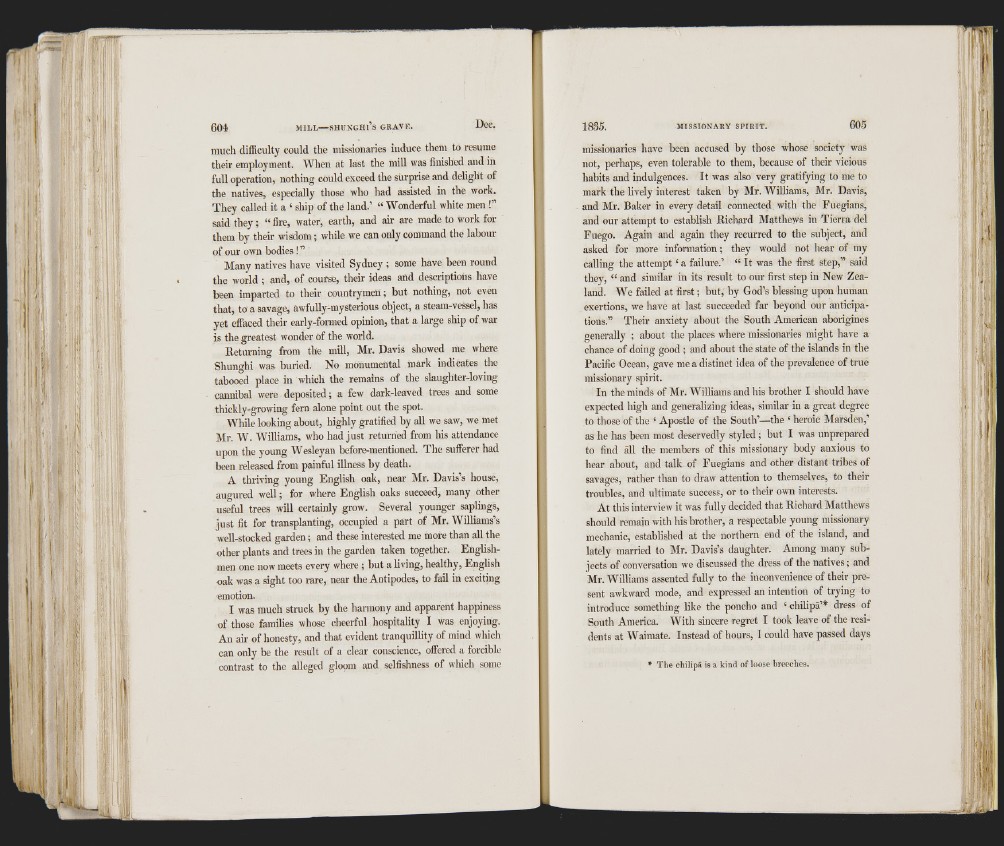
r i
604 MILL— SHnNGHI S GRAVE. Dec. 1835. MISSIONARY SPIRIT. 605 f,
¡1 i ‘
\ 1
l a r *
much difficulty could the missionaries induce them to resume
their employment. When at last the mill was finished and in
full operation, nothing could exceed the surprise and delight of
the natives, especially those who had assisted in the work.
They called it a ‘ ship of the land.’ “ Wonderful white men !”
said they; “ fire, water, earth, and air are made to work for
them by their wisdom; while we can only command the labour
of our own bodies ! ”
Many natives have visited Sydney ; some have been round
the world ; and, of course, tbeir ideas and descriptions have
been imparted to their countrymen; but nothing, not even
that, to a savage, awfully-mysterious object, a steam-vessel, has
yet effaced their early-formed opinion, that a large ship of war
is the greatest wonder of the world.
Returning from the mill, Mr. Davis showed me where
Shunghi was buried. No monumental mark indicates the
tabooed place in which the remains of the slaughter-loving
cannibal were deposited; a few dark-leaved trees and some
thickly-groiring fern alone point out the spot.
While looking about, highly gratified by all we saw, we met
Mr. W. Williams, who had just returned from his attendance
upon the young Wesleyan before-mentioned. The sufferer had
been released from painful illness by death.
A thriving young English oak, near Mr. Davis’s house,
augured well; for where English oaks succeed, many other
useful trees will certainly grow. Several younger saplings,
just fit for transplanting, occupied a part of Mr. Williams’s
well-stocked garden; and these interested me more than all the
other plants and trees in the garden taken together. Englishmen
one now meets every where ; but a living, healthy, English
oak was a sight too rare, near the Antipodes, to fail in exciting
emotion.
I was much struck by the harmony and apparent happiness
of those families whose cheerful hospitality I was enjoying.
An air of honesty, and that evident tranquillity of mind which
can only be the result of a clear conscience, offered a forcible
contrast to the alleged gloom and selfishness of which some
missionaries have been accused by those whose society was
not, perhaps, even tolerable to them, because of their vicious
habits and indulgences. I t was also very gratifying to me to
mark the lively interest taken by Mr. Williams, Mr. Davis,
and Mr. Baker in every detail connected with the Fuegians,
and our attempt to establish Richard Matthews in Tierra del
Fuego. Again and again they recurred to the subject, and
asked for more information; they would not hear of my
calling the attempt ‘ a failure.’ “ It was the first step,” said
they, “ and similar in its result to our first step in New Zealand
We failed at first; but, by God’s blessing upon human
exertions, we have at last succeeded far beyond our anticipations.”
Their anxiety about the South American aborigines
generally ; about the places where missionaries might have a
chance of doing good ; and about the state of the islands in the
Pacific Ocean, gave me a distinct idea of the prevalence of true
missionary spirit.
In the minds of Mr. Williams and his brother I should have
expected high and generalizing ideas, similar in a great degree
to those of the ‘ Apostle of the South’—the ‘ heroic Marsden,’
as he has been most deservedly styled ; hut I was unprepared
to find all the members of this missionary hody anxious to
hear ahout, and talk of Fuegians and other distant tribes of
savages, rather than to draw attention to themselves, to their
troubles, and ultimate success, or to their own interests.
At this interview it was fully decided that Richard Matthews
should remain with his brother, a respectable young missionary
mechanic, established at the northern end of the island, and
lately married to Mr. Davis’s daughter. Among many subjects
of conversation we discussed the dress of the natives; and
Mr. Williams assented fully to the inconvenience of their present
awkward mode, and expressed an intention of trying to
introduce something like the poncho and ‘ chilipa’* dress of
South America. With sincere regret I took leave of the residents
at Waimate. Instead of hours, I could have passed days
* The chilipa is a kind of loose breeches.
i r
■iii[
Ill
m i l
i l l
liiil '
ih
I
11(811
■ r-iH
i » 4
I F
-r-5! I si
f l
J l ’